Do you ever find yourself reaching for that extra cup of coffee just to make it through the afternoon slump? Or maybe your joints ache after a short walk, and you wonder if this is just a normal part of aging. What if I told you there’s a way to reclaim your energy, soothe those aches, and even potentially turn back the clock on your health? It’s not a magic pill or a fad diet, but a simple yet powerful approach called an anti-inflammatory diet.
A few years ago, I was feeling constantly exhausted, battling brain fog, and noticing my joints were creaking more than usual. I chalked it up to stress and getting older, but deep down, I knew something wasn’t right. After some research, I stumbled upon the concept of anti-inflammatory eating. Skeptical at first, I decided to give it a try. Within weeks, I noticed a remarkable shift. My energy levels soared, my brain fog lifted, and those nagging aches and pains subsided. I felt like a new person, and I haven’t looked back since.
The Power of an Anti-Inflammatory Diet

Inflammation is a natural part of your body’s healing process, a bit like a tiny fire that flares up when you get a cut or battle a cold. This acute inflammation is actually a good thing, a sign that your immune system is working to protect you. However, sometimes that fire can smolder out of control, leading to chronic inflammation. This persistent inflammation has been linked to a myriad of health issues, from joint pain and fatigue to serious conditions like heart disease, diabetes, and even cancer.
That’s where the incredible power of an anti-inflammatory diet comes into play. By making simple swaps – replacing processed foods, sugary drinks, and unhealthy fats with a vibrant array of fruits, vegetables, whole grains, and lean protein – you’re essentially dousing that inflammatory fire with a refreshing wave of nutrients. These nutrient powerhouses are packed with antioxidants, which act like tiny firefighters, neutralizing harmful free radicals and calming the inflammatory response.
Think of an anti-inflammatory diet as a culinary makeover for your body, one that nourishes your cells and sets the stage for long-term well-being. It’s not just about preventing chronic diseases; it’s about feeling your best every day. Imagine waking up with more energy, experiencing less pain and stiffness, and enjoying a clearer mind. These are just some of the potential benefits of embracing an anti-inflammatory lifestyle.
Nourish Your Body with Anti-Inflammatory Superstars
An anti-inflammatory diet isn’t about deprivation; it’s about embracing a delicious and diverse range of foods that love your body back. Imagine your plate as a canvas, ready to be filled with vibrant colors and flavors that nourish your cells and fight inflammation. Let’s explore some of the anti-inflammatory superstars that deserve a starring role in your meals:
-
Vibrant Vegetables: Load up on leafy greens like kale, spinach, and Swiss chard, which are packed with antioxidants and vitamins that combat inflammation. Don’t forget cruciferous veggies like broccoli and Brussels sprouts, which contain special compounds that help your body detoxify and reduce inflammation.
-
Fabulous Fruits: Berries, in particular, are bursting with antioxidants and polyphenols, which have potent anti-inflammatory effects. Think blueberries, strawberries, raspberries, and blackberries – a symphony of flavors that also benefit your heart and brain.
-
Omega-3-Rich Fish: Fatty fish like salmon, mackerel, and sardines are teeming with omega-3 fatty acids, renowned for their ability to quell inflammation throughout the body. Aim for at least two servings per week to reap the rewards.
-
Healthy Fats: Extra virgin olive oil, avocados, and nuts like almonds and walnuts are rich in healthy fats that lubricate your joints, protect your heart, and even help you feel fuller longer.
-
Spices with a Kick: Turmeric, with its active compound curcumin, is a true anti-inflammatory powerhouse. Add it to curries, smoothies, or even warm milk for a soothing and healing treat. Ginger and garlic also boast anti-inflammatory properties, so don’t hesitate to spice up your dishes!
These are just a few highlights from the vast array of anti-inflammatory foods available. By incorporating a variety of these nutrient-dense options into your diet, you’ll be fueling your body with the tools it needs to fight inflammation, promote healing, and thrive.
Beware of Inflammatory Culprits

Just as there are foods that soothe and nourish your body, there are also dietary villains that can fan the flames of inflammation. Think of these as the troublemakers at the party, the ones who disrupt the harmony and leave you feeling less than your best. Let’s shine a spotlight on some of the inflammatory culprits you might want to avoid or limit:
-
Processed Foods: These sneaky culprits are often laden with added sugars, unhealthy fats, and artificial ingredients, all of which can trigger inflammation. Think packaged snacks, sugary cereals, and those tempting fast food meals. While they may be convenient, they’re not doing your body any favors.
-
Refined Carbohydrates: White bread, white rice, and sugary pastries may taste good in the moment, but they quickly spike your blood sugar and contribute to inflammation. Choose whole grains instead, which offer fiber and sustained energy.
-
Sugary Drinks: Sodas, sweetened iced teas, and other sugary beverages are liquid inflammation bombs. They deliver a hefty dose of sugar without any nutritional value, sending your blood sugar on a rollercoaster ride and fueling inflammation.
-
Red and Processed Meats: While a juicy steak may be tempting, research suggests that red and processed meats can increase inflammation markers in your body. Enjoy them in moderation and explore lean protein sources like fish, poultry, beans, and lentils.
-
Unhealthy Fats: Trans fats, found in some processed foods, are notorious for their inflammatory effects. Limit your intake of fried foods and baked goods that may contain these harmful fats.
By being mindful of these inflammatory culprits and making conscious choices to limit them, you’ll be taking a significant step towards a healthier, less inflamed you. Remember, it’s not about perfection; it’s about progress. Every small change you make towards a more anti-inflammatory diet can have a positive impact on your overall well-being.
Your 21-Day Anti-Inflammatory Journey: A Roadmap to Wellness
Embarking on a 21-day anti-inflammatory journey is like setting out on a culinary adventure, one that will transform not only your plate but also your overall well-being. It’s a chance to discover new flavors, nourish your body, and experience the profound benefits of reducing inflammation.
Here’s a glimpse of what your journey might look like:
-
Week 1: Laying the Foundation: Start by cleaning out your pantry and stocking up on anti-inflammatory superstars. Focus on fresh produce, lean proteins, whole grains, and healthy fats. Experiment with new recipes that incorporate these ingredients and discover delicious ways to enjoy them.
-
Week 2: Exploring New Flavors: As you become more comfortable with anti-inflammatory eating, explore new culinary horizons. Try adding turmeric to your smoothies, roasting vegetables with herbs and spices, or creating colorful salads with a variety of greens and berries.
-
Week 3: Fine-tuning Your Habits: By now, you’ll be well on your way to establishing a sustainable anti-inflammatory lifestyle. Focus on fine-tuning your habits, making mindful choices about what you eat, and listening to your body’s cues.
Here are some additional tips to guide you along the way:
-
Stay Hydrated: Water is essential for flushing out toxins and reducing inflammation. Aim for at least eight glasses a day, and consider adding a squeeze of lemon or a few slices of cucumber for flavor.
-
Get Moving: Regular exercise, even moderate activity like walking or yoga, can help reduce inflammation and improve overall health.
-
Listen to Your Body: Pay attention to how different foods make you feel. If you notice certain foods trigger inflammation or discomfort, consider reducing or eliminating them from your diet.
Remember, this is a journey, not a race. Embrace the process, experiment with new flavors, and celebrate the positive changes you experience along the way. By the end of 21 days, you’ll be well on your way to a healthier, happier, and less inflamed you!
The 21-Day Anti-Inflammatory Diet Meal Plan
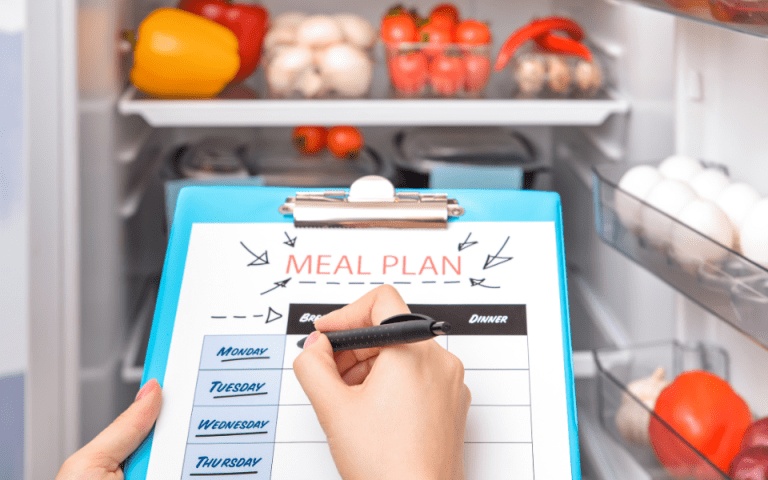
The meal plan below is designed to be a delicious and satisfying way to kickstart your anti-inflammatory journey. It typically provides around 1500 calories per day, which is a good starting point for many people. However, remember that everyone’s needs are different. Feel free to adjust portion sizes or swap in similar ingredients to match your individual calorie goals and preferences. The most important thing is to focus on enjoying real, whole foods that nourish your body and reduce inflammation.
Let’s get started on your path to feeling more energized, vibrant, and pain-free!
Day 1:
Breakfast
- 1 cup Green smoothie (spinach, kale, apple, lemon)
- ½ cup Oatmeal (prepared with almond milk)
- 1 Tbsp Blueberries
- ½ Tbsp Cinnamon
Morning Snack
- ½ cup Almonds
Lunch
- 1 cup Quinoa salad (tomatoes, cucumber, olive oil)
- 4 oz Grilled salmon
- 1 handful of nuts or seeds
- 1 Apple
Afternoon Snack
- ½ cup Carrot sticks
Dinner
- 1 cup Vegetable soup (carrots, celery, zucchini)
- 4 oz Grilled chicken breast
- 1 cup Steamed broccoli
Evening Snack
- 1 Orange
Day 2:
Breakfast
- 1 cup Fresh orange and carrot juice
- 2 slices Whole wheat toast
- 2 Tbsp Natural peanut butter
Morning Snack
- 1 cup Soy yogurt
Lunch
- 1 cup Lentil salad with mixed vegetables (olive oil)
- 4 oz Grilled mackerel
- 1 Banana
Afternoon Snack
- ½ cup Cucumber slices
Dinner
- 1 cup Vegetable stir-fry with tofu
- ½ cup Brown rice
Evening Snack
- 1 Pear
Day 3:
Breakfast
- 1 cup Fruit smoothie (banana, berries, almond milk)
- 1 slice Whole grain toast
- ½ Avocado
Morning Snack
- ½ cup Walnuts
Lunch
- 1 cup Tomato soup with herbs
- 4 oz Grilled chicken breast or fish
- 1 Orange
Afternoon Snack
- 1 Apple
Dinner
- 4 oz Baked cod
- 1 Sweet potato
- 1 cup Mixed green salad
Evening Snack
- 1 cup Berries
Day 4:
Breakfast
- 1 cup Soy yogurt
- 2 Tbsp Chia seeds
- 1 cup Mixed berries
- 1 slice Whole wheat bread
Morning Snack
- ½ cup Almonds
Lunch
- 1 cup Lentil soup with vegetables
- 4 oz Grilled chicken breast
- 1 cup Steamed spinach
Afternoon Snack
- 1 Carrot
Dinner
- 4 oz Grilled tofu
- 1 cup Roasted vegetables (bell peppers, zucchini, eggplant)
Evening Snack
- 1 Apple
Day 5:
Breakfast
- 1 cup Green smoothie (spinach, celery, lemon)
- ½ cup Oatmeal (prepared with almond milk)
- 1 Tbsp Blueberries
- 1 Banana
Morning Snack
- 1 cup Mixed nuts
Lunch
- 1 cup Tabouli salad with grilled chicken
- 1 simple green salad (lettuce, cucumber, olive oil)
Afternoon Snack
- 1 Cucumber
Dinner
- 4 oz Grilled salmon
- 1 cup Quinoa
- 1 cup Cucumber and olive oil salad
Evening Snack
- 1 Apple
Day 6:
Breakfast
- 1 cup Fresh fruit juice (pineapple, apple)
- 2 slices Whole wheat toast
- ½ cup Tofu scramble
Morning Snack
- 1 cup Soy yogurt
Lunch
- 1 cup Vegetable soup with brown rice
- 4 oz Grilled chicken with vegetables
- 1 Apple
Afternoon Snack
- ½ cup Mixed nuts
Dinner
- 4 oz Grilled chicken or fish
- 1 cup Sautéed vegetables
- 1 cup Mixed green salad
Evening Snack
- 1 Banana
Day 7:
Breakfast
- 1 cup Fruit smoothie (berries, banana, almond milk)
- 1 slice Whole wheat toast
- ½ Avocado
Morning Snack
- ½ cup Almonds
Lunch
- 1 cup Mixed vegetable salad with grilled chicken
- 1 cup Tomato soup
Afternoon Snack
- 1 Apple
Dinner
- 4 oz Baked cod
- 1 cup Roasted vegetables
- 1 cup Mixed green salad
Evening Snack
- 1 cup Mixed berries
Day 8:
Breakfast
- 1 cup Spinach and banana smoothie (spinach, banana, almond milk)
- ½ cup Steel-cut oats (prepared with almond milk)
- 1 Tbsp Chia seeds
- ½ cup Fresh strawberries
Morning Snack
- 1 cup Sliced bell peppers
Lunch
- 1 cup Chickpea salad (chickpeas, cucumber, tomatoes, parsley, olive oil)
- 4 oz Grilled tilapia
- 1 Pear
Afternoon Snack
- ½ cup Edamame
Dinner
- 1 cup Butternut squash soup
- 4 oz Baked chicken thighs
- 1 cup Steamed green beans
Evening Snack
- 1 Kiwi
Day 9:
Breakfast
- 1 cup Mixed berry smoothie (blueberries, raspberries, blackberries, almond milk)
- 2 slices Whole grain bread
- 2 Tbsp Almond butter
Morning Snack
- 1 Apple
Lunch
- 1 cup Spinach and kale salad (spinach, kale, cherry tomatoes, cucumbers, olive oil)
- 4 oz Grilled shrimp
- ½ cup Quinoa or brown rice
- 1 Orange
Afternoon Snack
- 1 cup Sliced cucumber
Dinner
- 1 cup Minestrone soup
- 4 oz Baked tofu
- 1 cup Roasted Brussels sprouts
Evening Snack
- 1 Handful of walnuts
Day 10:
Breakfast
- 1 cup Pineapple and mango smoothie (pineapple, mango, coconut water)
- ½ cup Quinoa flakes (prepared with water or almond milk)
- 1 Tbsp Flaxseeds
- ½ cup Fresh raspberries
Morning Snack
- 1 Handful of pumpkin seeds
Lunch
- 1 cup Lentil and vegetable stew
- 4 oz Grilled turkey breast
- 1 Apple
Afternoon Snack
- ½ cup Cherry tomatoes
Dinner
- 1 cup Carrot and ginger soup
- 4 oz Baked haddock
- 1 cup Steamed asparagus
Evening Snack
- 1 Clementine
Day 11:
Breakfast
- 1 cup Kale and pineapple smoothie (kale, pineapple, almond milk)
- ½ cup Oat bran (prepared with water or almond milk)
- 1 Tbsp Hemp seeds
- ½ cup Fresh blueberries
Morning Snack
- 1 Handful of mixed nuts
Lunch
- 1 cup Black bean and corn salad
- 4 oz Grilled scallops
- 1 cup Mixed greens or grilled vegetables
- 1 Peach
Afternoon Snack
- ½ cup Sliced radishes
Dinner
- 1 cup Tomato basil soup
- 4 oz Grilled chicken breast
- 1 cup Steamed carrots
Evening Snack
- 1 Apple
Day 12:
Breakfast
- 1 cup Mixed fruit smoothie (orange, banana, spinach, almond milk)
- ½ cup Buckwheat groats (prepared with water or almond milk)
- 1 Tbsp Sunflower seeds
- ½ cup Fresh blackberries
Morning Snack
- 1 Handful of almonds
Lunch
- 1 cup Zucchini and tomato salad
- 4 oz Baked cod
- 1 Plum
Afternoon Snack
- 1 Carrot, sliced
Dinner
- 1 cup Sweet potato and turmeric soup
- 4 oz Grilled chicken thighs
- 1 cup Steamed broccoli
Evening Snack
- 1 Handful of pistachios
Day 13:
Breakfast
- 1 cup Raspberry and spinach smoothie (raspberries, spinach, almond milk)
- ½ cup Farro (prepared with water or almond milk)
- 1 Tbsp Pumpkin seeds
- ½ cup Fresh cranberries
Morning Snack
- 1 Handful of cashews
Lunch
- 1 cup Cucumber and dill salad
- 4 oz Grilled sardines
- additional protein such as boiled egg or tofu
- 1 Nectarine
Afternoon Snack
- 1 Bell pepper, sliced
Dinner
- 1 cup Beetroot and ginger soup
- 4 oz Grilled tofu
- 1 cup Steamed green beans
Evening Snack
- 1 Apple
Day 14:
Breakfast
- 1 cup Blueberry and kale smoothie (blueberries, kale, almond milk)
- ½ cup Amaranth (prepared with water or almond milk)
- 1 Tbsp Sesame seeds
- ½ cup Fresh cherries
Morning Snack
- 1 Handful of sunflower seeds
Lunch
- 1 cup Spinach and quinoa salad
- 4 oz Grilled trout
- 1 Grapefruit
Afternoon Snack
- 1 Cucumber, sliced
Dinner
- 1 cup Red lentil soup
- 4 oz Grilled chicken breast
- 1 cup Steamed zucchini
Evening Snack
- 1 Handful of almonds
Day 15:
Breakfast
- 1 cup Mango and spinach smoothie (mango, spinach, almond milk)
- ½ cup Steel-cut oats (prepared with almond milk)
- 1 Tbsp Chia seeds
- ½ cup Fresh strawberries
Morning Snack
- 1 Handful of almonds
Lunch
- 1 cup Chickpea and tomato salad (chickpeas, tomatoes, parsley, olive oil)
- 4 oz Grilled salmon
- 1 Apple
Afternoon Snack
- ½ cup Carrot sticks
Dinner
- 1 cup Broccoli and cauliflower soup
- 4 oz Baked chicken breast
- 1 cup Steamed green beans
Evening Snack
- 1 Kiwi
Day 16:
Breakfast
- 1 cup Blueberry and banana smoothie (blueberries, banana, almond milk)
- 2 slices Whole grain bread
- 2 Tbsp Natural peanut butter
Morning Snack
- 1 Apple
Lunch
- 1 cup Spinach and kale salad (spinach, kale, cherry tomatoes, cucumbers, olive oil)
- 4 oz Grilled mackerel
- 1 Orange
Afternoon Snack
- 1 cup Sliced cucumber
Dinner
- 1 cup Lentil soup
- 4 oz Grilled tofu
- 1 cup Roasted Brussels sprouts
Evening Snack
- 1 Handful of walnuts
Day 17:
Breakfast
- 1 cup Pineapple and coconut smoothie (pineapple, coconut milk)
- ½ cup Quinoa flakes (prepared with water or almond milk)
- 1 Tbsp Flaxseeds
- ½ cup Fresh raspberries
Morning Snack
- 1 Handful of pumpkin seeds
Lunch
- 1 cup Mixed vegetable stew
- 4 oz Grilled turkey breast
- 1 simple green salad (lettuce, cucumber, olive oil)
- 1 Apple
Afternoon Snack
- ½ cup Cherry tomatoes
Dinner
- 1 cup Carrot and turmeric soup
- 4 oz Baked cod
- 1 Sweet potato
Evening Snack
- 1 Clementine
Day 18:
Breakfast
- 1 cup Kale and peach smoothie (kale, peach, almond milk)
- ½ cup Oat bran (prepared with water or almond milk)
- 1 Tbsp Hemp seeds
- ½ cup Fresh blueberries
Morning Snack
- 1 Handful of mixed nuts
Lunch
- 1 cup Black bean and corn salad
- 4 oz Grilled scallops
- 1 Peach
Afternoon Snack
- ½ cup Sliced radishes
Dinner
- 1 cup Tomato and basil soup
- 4 oz Grilled chicken breast
- 1 cup Steamed carrots
Evening Snack
- 1 Apple
Day 19:
Breakfast
- 1 cup Mixed fruit smoothie (orange, banana, spinach, almond milk)
- ½ cup Buckwheat groats (prepared with water or almond milk)
- 1 Tbsp Sunflower seeds
- ½ cup Fresh blackberries
Morning Snack
- 1 Handful of almonds
Lunch
- 1 cup Zucchini and tomato salad
- 4 oz Baked salmon
- ½ cup Quinoa or brown rice
- 1 Plum
Afternoon Snack
- 1 Carrot, sliced
Dinner
- 1 cup Sweet potato and ginger soup
- 4 oz Grilled chicken thighs
- 1 cup Steamed broccoli
Evening Snack
- 1 Handful of pistachios
Day 20:
Breakfast
- 1 cup Raspberry and spinach smoothie (raspberries, spinach, almond milk)
- ½ cup Farro (prepared with water or almond milk)
- 1 Tbsp Pumpkin seeds
- ½ cup Fresh cranberries
Morning Snack
- 1 Handful of cashews
Lunch
- 1 cup Cucumber and dill salad
- 4 oz Grilled sardines
- 1 Nectarine
Afternoon Snack
- 1 Bell pepper, sliced
Dinner
- 1 cup Beetroot and ginger soup
- 4 oz Grilled chicken breast
- 1 cup Steamed green beans
Evening Snack
- 1 Apple
Day 21:
Breakfast
- 1 cup Blueberry and kale smoothie (blueberries, kale, almond milk)
- ½ cup Amaranth (prepared with water or almond milk)
- 1 Tbsp Sesame seeds
- ½ cup Fresh cherries
Morning Snack
- 1 Handful of sunflower seeds
Lunch
- 1 cup Spinach and quinoa salad
- 4 oz Grilled trout
- 1 Grapefruit
Afternoon Snack
- 1 Cucumber, sliced
Dinner
- 1 cup Red lentil soup
- 4 oz Grilled chicken thighs
- 1 cup Steamed zucchini
Evening Snack
- 1 Handful of almonds
Are you ready to embark on a journey towards a healthier, more vibrant you? The 21-Day Anti-Inflammatory Diet Adventure is your passport to a life filled with energy, vitality, and a newfound appreciation for the incredible power of food.
By embracing this delicious and nourishing way of eating, you’re not just changing your diet; you’re transforming your relationship with your body. You’re saying goodbye to chronic inflammation and hello to a life filled with possibility. So, what are you waiting for? Let’s raise a glass of antioxidant-rich green juice and toast to your health! Your 21-day adventure awaits, and it promises to be a delicious and rewarding one.
References
-
Anti-Inflammatory Diets and Chronic Diseases: A comprehensive review published in the journal Nutrients in 2020 highlighted the potential of anti-inflammatory diets to reduce the risk and manage symptoms of various chronic diseases, including cardiovascular disease, type 2 diabetes, and certain types of cancer.https://www.mdpi.com/2072-6643/12/5/1456
-
Mediterranean Diet and Inflammation: Numerous studies have shown the Mediterranean diet, rich in fruits, vegetables, whole grains, fish, and olive oil, to be highly effective in reducing inflammation and promoting overall health. A 2016 review found that this diet significantly lowered C-reactive protein (CRP) levels, a marker of inflammation in the body.https://www.medicalnewstoday.com/articles/do-anti-inflammatory-diets-really-work
-
Anti-Inflammatory Diet and Pain Management: A pilot study published in Frontiers in 2023 explored the impact of an anti-inflammatory diet on chronic pain and found promising results, suggesting that dietary changes could play a role in pain management strategies.https://www.frontiersin.org/articles/10.3389/fnut.2023.1205526
-
Anti-Inflammatory Diet and Mental Health: Emerging research suggests a connection between inflammation and mental health conditions like depression and anxiety. Some studies have shown that anti-inflammatory diets may help improve mood and reduce symptoms in certain individuals.https://www.ncbi.nlm.nih.gov/pmc/articles/PMC7468860/
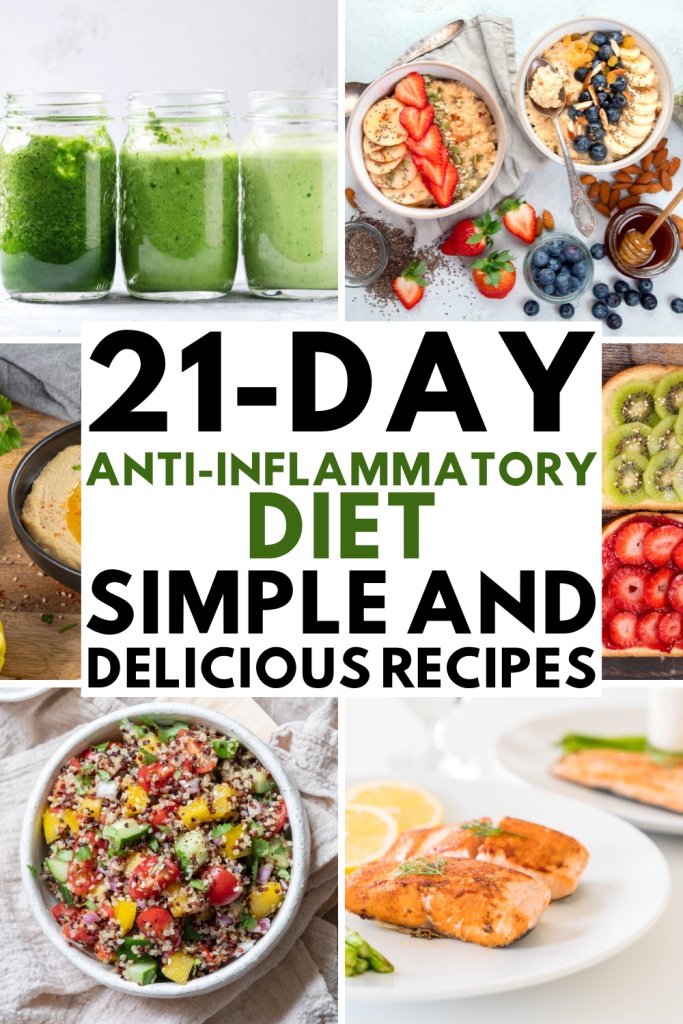
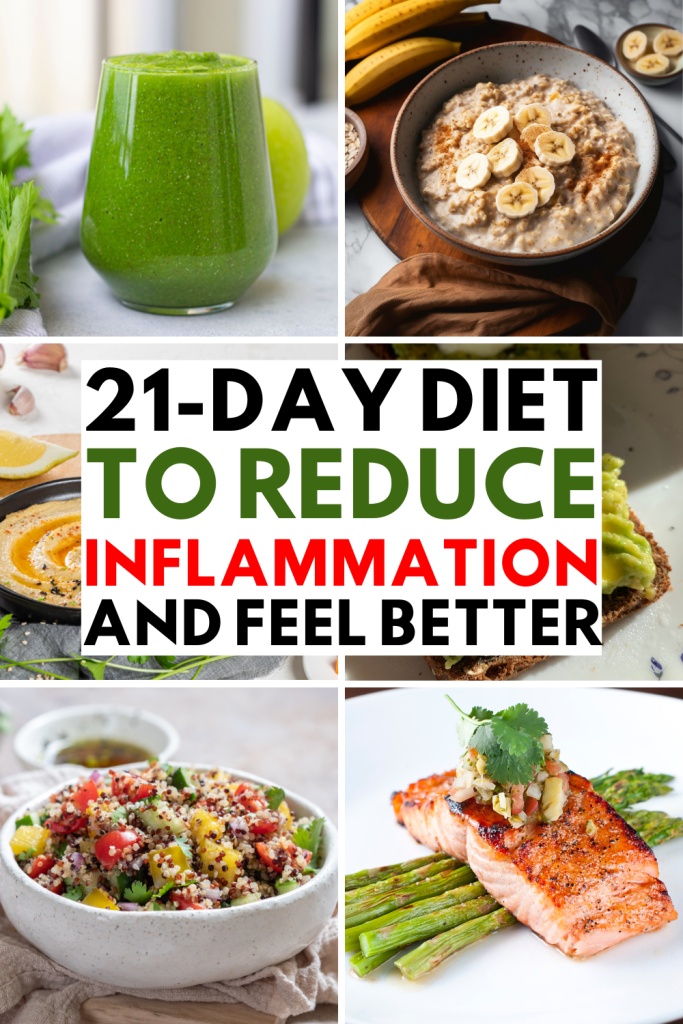
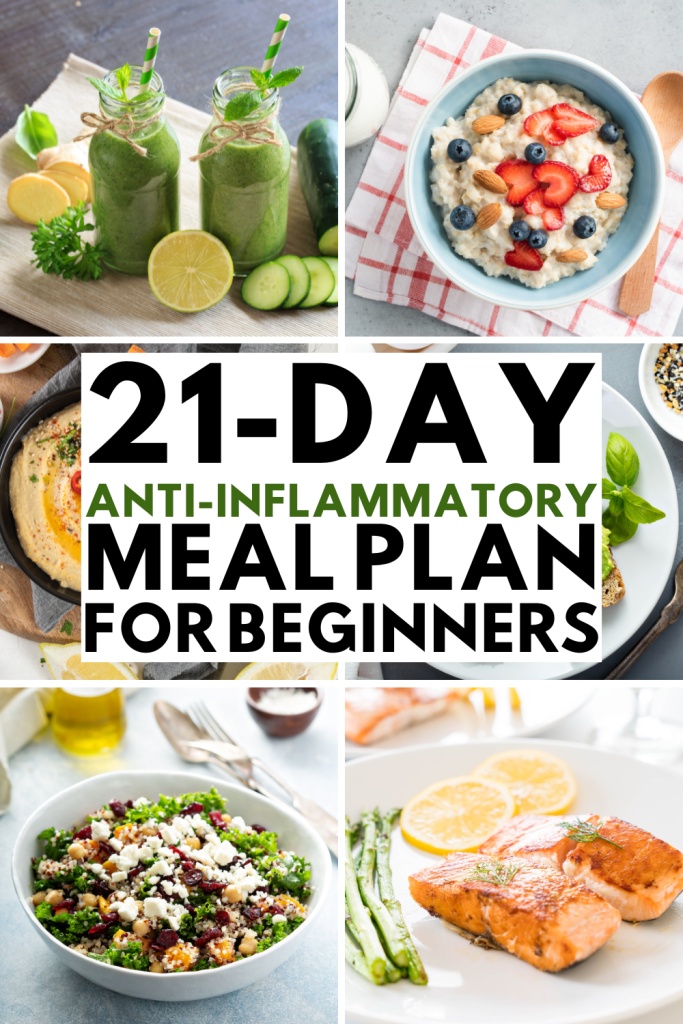
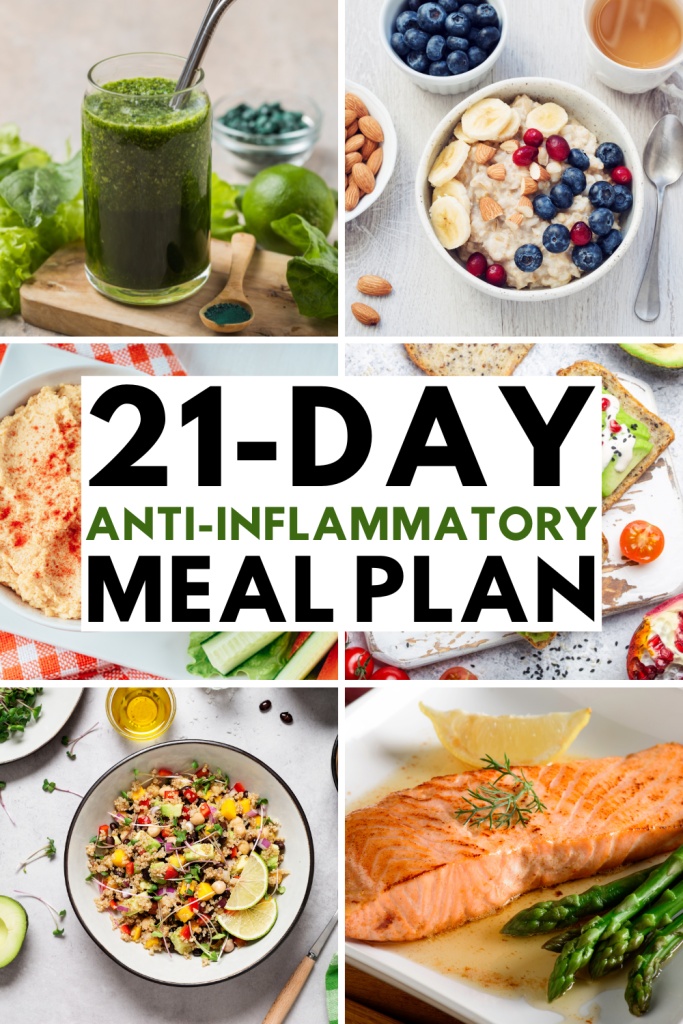
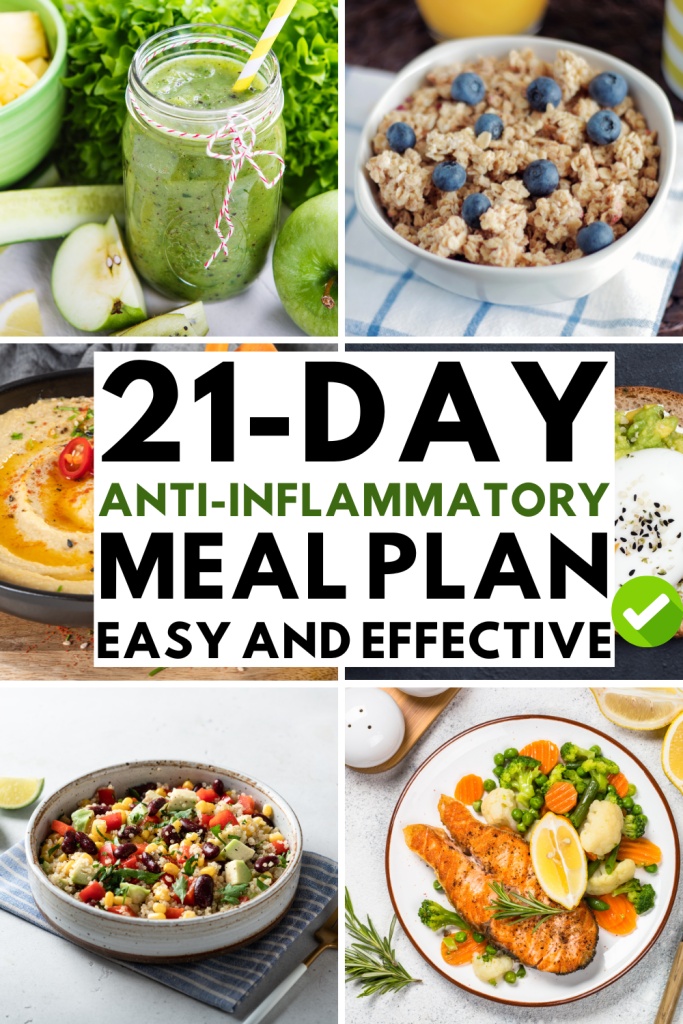

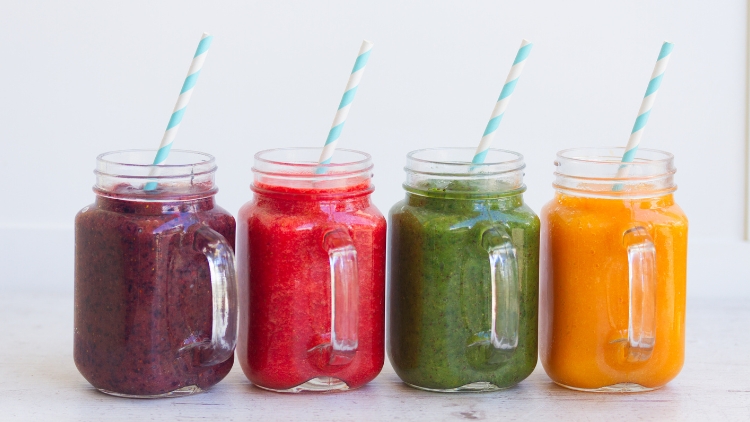





2 Responses
This 21-day anti-inflammatory diet plan has been a game-changer for me! I’ve been dealing with chronic inflammation for years and nothing seemed to help. But these meals are not only delicious, they’ve actually made a noticeable difference in how I feel. The recipes are easy to make and packed with flavor. I feel more energized and less bloated. I can’t recommend this plan enough for anyone looking to improve their health and enjoy their food at the same time!
Thank you so much for sharing your experience! We’re thrilled to hear that our 21-day anti-inflammatory diet plan has made a positive impact on your health. It’s wonderful to know that you’re enjoying the meals and feeling better. Our mission is to help people heal their bodies through delicious, nutritious food, so your feedback means the world to us. Keep up the great work, and please let us know if you have any questions or need further assistance. We’re here to support you!